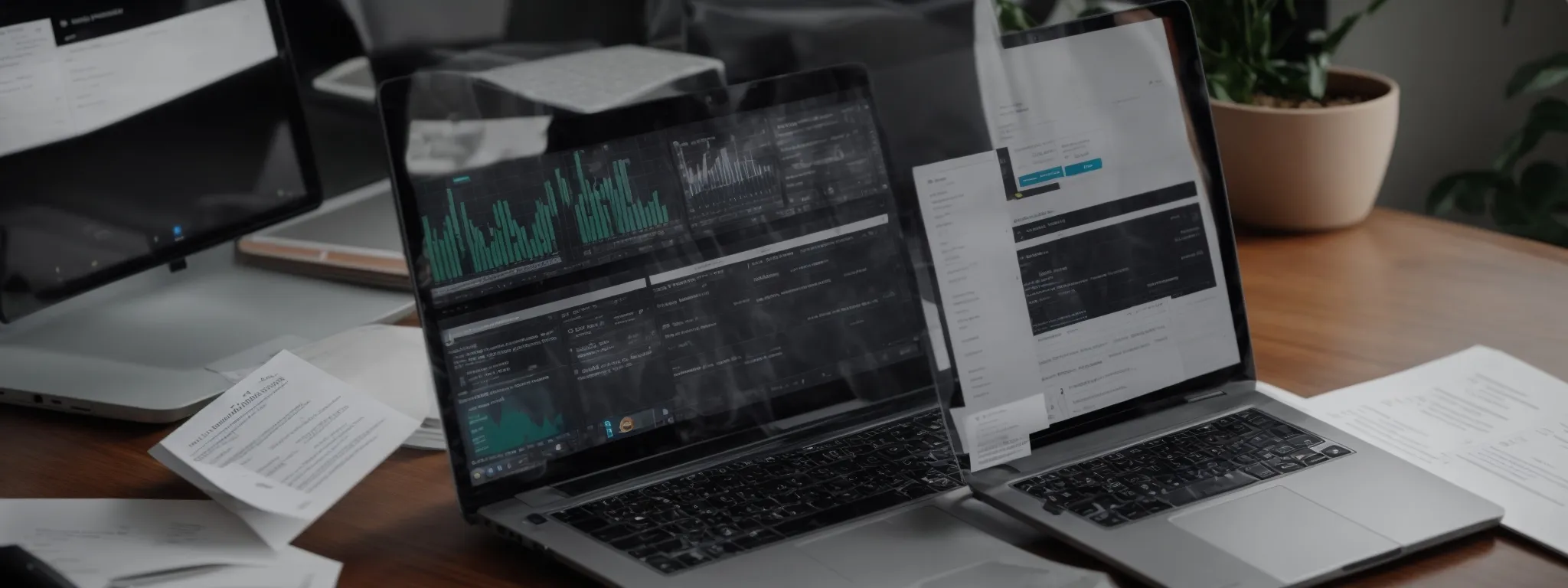LSI Keywords
Understanding LSI Keywords for SEO Content Optimization In the labyrinth of search engine optimization, Latent Semantic Indexing (LSI) keywords emerge as the linchpin for honing your SEO […]
Understanding LSI Keywords for SEO Content Optimization
In the labyrinth of search engine optimization, Latent Semantic Indexing (LSI) keywords emerge as the linchpin for honing your SEO content strategy.
These sophisticated elements of search algorithms help search engines like Google to discern context and offer users content that resonates with the fabric of their query.
By weaving LSI keywords into your web page, marketers elevate user experience and signal relevance to search engine spiders.
Meanwhile, unraveling the mystery behind LSI can position your content to more prominently feature in SERPs.
Keep reading to unlock the potential of LSI keywords in augmenting your SEO efforts.
Key Takeaways
- LSI Keywords Enrich SEO Content Strategy by Improving Relevancy to the Searcher’s Intent and Search Engine Algorithms
- Strategic Placement of LSI Keywords Within Content Elements Like Meta Tags and Headers Is Crucial for Enhancing Search Engine Visibility
- LinkGraph’s SEO Services Use Advanced SEO Tools, Such as SearchAtlas SEO Software, to Identify Effective LSI Keywords
- Monitoring Changes in Content Performance After LSI Optimization Is Essential for Refining SEO Strategies and Maintaining Alignment With User and Search Engine Requirements
- Balancing LSI Keyword Density Is Key to Preserving Readability and Ensuring Content Aligns With Evolving Search Engine Best Practices
Demystifying LSI Keywords for SEO Enhancement

Within the dynamic realm of Search Engine Optimization, understanding the nuances of Latent Semantic Indexing (LSI) keywords is paramount for refining SEO content strategy.
These keywords embody more than mere synonyms; they are contextually related terms that search engines utilize to decipher the depth and relevance of web content.
By integrating LSI keywords, marketers vastly improve their content’s resonance with both the audience’s search intent and the sophisticated nuances of search engine algorithms.
The relationship they share with SERP rankings is unequivocal, positioning them as a cornerstone for any SEO professional aiming to elevate their presence in Google search results.
As we dive into the intricacies of LSI keywords, one will grasp their critical role not only in enhancing content’s pertinence but also in paving the way for improved search engine visibility.
Define LSI Keywords and Their Role in SEO
LSI keywords are a class of data that search engine algorithms prioritize to decipher the thematic signals of a given web page. These terms are closely related to the main keyword, enhancing the content’s semantic relevance and aiding in painting a more comprehensive picture for search engines about the topic discussed.
The deployment of LSI keywords can significantly bolster the user’s experience by aligning content more closely with the searcher’s intent, thereby increasing a webpage’s potential to climb in search engine rankings. Employing such sophisticated techniques is a testament to LinkGraph’s SEO services‘ commitment to cutting-edge, audience-centric SEO strategies.
Exploring How LSI Keywords Improve Content Relevance
Employing LSI keywords is a strategic approach to boost the pertinence of content: they expand the topical footprint of a web page beyond the main keyword or phrase. By incorporating a range of semantically linked terms, LinkGraph’s SEO services harness the power of LSI to solidify the relevance of content to both users and search engine algorithms.
| Main Keyword | Related LSI Keywords | User Benefit | SEO Impact |
|---|---|---|---|
| Organic Gardening | Composting, heirloom seeds, soil health | Richer content exploration | Enhanced topical authority |
| Smart Homes | IoT devices, energy efficiency, home automation | Comprehensive information | Increased content depth |
LinkGraph’s SEO professionals leverage LSI keywords to skirt the dangers of keyword stuffing. Thoughtful integration of these terms leads to natural, engaging content that resonates with audiences and aligns neatly with Google’s Hummingbird algorithm, which prizes context and meaning over mere keyword occurrence.
Understanding the Relationship Between LSI Keywords and SERP Rankings
Grasping the alliance between LSI keywords and Search Engine Results Page (SERP) rankings sheds light on the art of SEO mastery. LSI keywords elevate a page’s SEO by enhancing its perceived value to search algorithms, which are designed to discern the richness and applicability of a page’s content relative to user queries.
LinkGraph’s SEO services harness this relationship adeptly, blending LSI keywords into client’s content portfolios to not only streamline their alignment with search queries but to fortify their stance on SERPs. A tactical use of LSI terms is a key facet of a robust SEO strategy that leads to heightened visibility and potentially higher conversions.
How to Identify LSI Keywords for Your Content

The quest for mastering LSI keywords begins with a profound understanding of the methods for their discovery, imperative for the optimization of SEO content.
Seasoned SEO professionals, including the experts at LinkGraph, employ a variety of tools and techniques to pinpoint the LSI keywords that will most significantly amplify the relevance and reach of online content.
From delving into the competitive landscape to extract LSI inspiration to utilizing Google’s ‘Searches Related To’ feature for additional context, identifying the right LSI terms is a calculated pursuit.
This intricate process ensures that every piece of content is not only primed for search engine algorithms but also deeply resonates with audience’s queries and interests.
Tools and Techniques for Finding LSI Keywords
The acquisition of LSI keywords begins with leveraging sophisticated SEO tools, like LinkGraph’s SearchAtlas SEO software, which features a highly effective keyword generator. SearchAtlas enables users to uncover related keywords and variations that complement the main search term, thus empowering the development of a nuanced SEO content strategy.
Savy SEO professionals at LinkGraph also utilize the LSI Graph and LSI Keyword Generator for an expansive list of contextually relevant terms. These LSI tools, when combined with a free backlink analysis from LinkGraph’s suite of resources, provide a comprehensive understanding of keyword opportunities and competitive insights:
| Primary Tool | Secondary Resource | LSI Keywords Identified | Competitive Insight |
|---|---|---|---|
| SearchAtlas SEO Software | Keyword Generator | Semantic Variations | Keyword Relevance |
| LSI Graph | Free Backlink Analysis | Related Terms | Market Positioning |
Analyzing Competitor Content for LSI Inspiration
Insightful SEO strategies often involve scrutinizing the content of industry competitors for LSI keywords, a tactic that offers a window into their SEO content strategy. Delving into the intricacies of high-ranking competitor pages can reveal a wealth of related keywords that resonate with shared target audiences and expose gaps in one’s own SEO approach.
LinkGraph’s SEO services empower clients by assessing competitive landscapes, identifying prevailing LSI keywords to better understand the search query ecosystem. This strategic analysis allows for informed decisions when crafting content, ensuring relevancy and improving organic reach within the search engine battlefield.
Leveraging Google’s ‘Searches Related To’ Feature
LinkGraph’s SEO experts recognize the value hidden within Google’s ‘Searches Related To’ feature as they leverage it to further refine their SEO content strategy. This valuable section at the bottom of Google search results acts as a treasure trove, revealing keyword variations and search phrases that real users frequently explore:
| Main Keyword | Google ‘Searches Related To’ | Improved Content Specification |
|---|---|---|
| Custom Bicycles | Custom bike frames, bespoke bicycles, handcrafted bikes | Targeting niche market segments |
| Gourmet Coffee Beans | Best arabica beans, single origin coffee, specialty coffee roasts | Enhancing product relevance |
By identifying and incorporating these suggested search terms and keyword phrases, LinkGraph’s SEO services enrich the content’s alignment with the search intent of potential visitors. The process aids in crafting content that not only satisfies the user’s query but also signals relevance and authority to search engines, increasing the potential for improved search engine rankings.
Incorporating LSI Keywords Into Your Content Strategy

Embarking on a strategic journey to optimize SEO content necessitates a keen understanding of how LSI keywords can be weaved into a content strategy without compromising the natural flow and readability.
Distinct from the antiquated practices of unrestrained keyword insertion, the art of integrating Latent Semantic Indexing (LSI) involves a nuanced approach that enriches content with thematically relevant terms.
This practice cultivates a fertile ground for creating content that resonates with the richness of topics and nuances of subjects, vital for capturing the essence of user and search engine requirements.
Ensuing discussions will elaborate on finesse-driven best practices for embedding these valuable semantic elements into a content strategy that balances keyword density, enhances topical richness, and establishes authoritative subject matter expertise.
Best Practices for Naturally Integrating LSI Keywords
Effective integration of LSI keywords begins with their strategic placement within the fabric of the content. LinkGraph’s SEO experts advocate for the dispersion of these terms across various elements of a page, including meta descriptions, alt texts, and especially within the natural flow of the body text to maintain user engagement and relevancy to the subject matter.
Emphasizing context rather than frequency, LinkGraph’s suite of on-page SEO services advises clients to judiciously weave LSI keywords into headings, subheadings, and the anchor text of internal links. This method ensures that content remains informative and relevant, while simultaneously signaling to search engines the depth of the subject being explored on the webpage.
Balancing Keyword Density With LSI Variants
The delicate equilibrium of keyword density is pivotal within SEO content optimization, and LinkGraph’s SEO services expertly guide this balance using LSI keyword variants. By strategically embedding LSI variants throughout the content, they mitigate risks of keyword stuffing while enhancing topical relevance, ensuring a piece that resonates with search algorithms and readers alike.
LinkGraph’s philosophy underscores the importance of subtlety and relevance; they advise incorporating LSI variants in a manner that naturally complements the narrative, adhering to a keyword density that supports rather than overwhelms the message conveyed:
| Content Section | Main Keyword Density | LSI Keyword Usage |
|---|---|---|
| Title Tag | Once (100%) | Smart, related variations |
| Body Text | 1-2% for readability | Integrated for context |
| Meta Description | Once (100%) | Selected for relevance |
Guided by these principles, LinkGraph’s on-page SEO services ensure that content not only aligns with search intent but also maintains a quality that garners user trust and engagement.
Creating Topically Rich Content Using LSI Keywords
The art of crafting topically rich content transcends mere keyword insertion, entering the realm of strategic keyword orchestration. LinkGraph’s SEO professionals recognize that the judicious use of LSI keywords can broaden a page’s thematic scope, thereby Enhancing Its Topical Authority and appealing more effectively to both the intended audience and search engine evaluators.
Elevated content sophistication is achieved through the nuanced integration of LSI keywords, not merely as mechanical additions, but as vital elements that intrinsically support and expand the narrative. This approach by LinkGraph’s SEO services leads to informative, multi-dimensional content that more accurately reflects the varied tapestry of user searches and interests within a given topic.
Boosting on-Page SEO With LSI Keywords

The intricacies of on-page search engine optimization (SEO) require more than a cursory sprinkling of keywords; it demands the purposeful integration of LSI phrases that resonate with the intent and context of searches.
Baking LSI keywords into the foundational elements of on-page content—meta titles, headers, and even multimedia—enhances clarity for search engines, thereby sharpening the efficacy of user discovery.
LinkGraph’s SEO services expertly reengineer on-page elements to infuse LSI-rich phrases, ensuring that each component, from the meta tags to the subheaders, operates as indicators of relevance and quality, significantly augmenting a website’s visibility and authority in a crowded digital ecosystem.
Optimizing Meta Tags and Descriptions With LSI Phrases
Optimizing meta tags and descriptions with LSI phrases is a strategic approach that not only aligns with search engine algorithms but also caters to the user’s quest for information. By embedding contextually relevant LSI keywords into these critical HTML elements, LinkGraph’s SEO services enhance the visibility of web pages, drawing a clearer correlation between search queries and content offerings.
Here is the journey reflecting how LinkGraph meticulously enhances on-page SEO through the integration of LSI keywords within meta elements:
- Conducting thorough LSI keyword research to ensure the phrases are aligned with user intent and search engine expectations.
- Incorporating these LSI phrases into title tags and meta descriptions to improve the page’s semantic signals and relevance.
- Regularly evaluating and updating meta tags to reflect evolving keyword research and maintain optimum search engine ranking performance.
The inclusion of LSI phrases in meta descriptions particularly propels a page’s relevance, succinctly informing users and search engines of the content’s context before a single click, and thereby potentially increasing organic traffic. This precision in summary language constructs a narrative that resonates with both latent user interests and search engine sophistication.
Structuring Content With LSI Keywords in Headers and Subheaders
Infusing headers and subheaders with LSI keywords represents a methodical approach to sculpting an organized narrative for both users and search engines. LinkGraph’s SEO services advise that strategic placement within these hierarchical elements not only categorizes content effectively but also enhances its searchability.
| Header Element | Integration of LSI Keywords | Outcome for SEO |
|---|---|---|
| H1 Tags | Incorporate primary LSI variations | Defines main topic for search bots |
| H2 Tags | Utilize secondary LSI terms | Strengthens content hierarchy and relevance |
| H3 Tags | Embed related LSI phrases | Enhances topical depth, aiding snippet visibility |
Executing the placement of LSI keywords in headers and subheaders with precision, LinkGraph paves the path for seamless content consumption and optimal indexing. This layering of contextually relevant LSI terms elevates the semantic understanding of the content, guiding search engines to accurately assess and rank web pages:
Enhancing Image and Video SEO With LSI Tags
Incorporating LSI keywords into the metadata of images and videos is a pivotal technique that LinkGraph employs to escalate the visibility of multimedia content on search engines. By tagging images and videos with relevant LSI terms, they ensure that these elements contribute to the overall SEO strength of a webpage, making it more discoverable for image and video searches.
LinkGraph’s SEO experts understand that multimedia content often communicates crucial information that text alone cannot capture, hence optimizing alt attributes and file names with LSI keywords bridges the gap between visual content and searchable terms. This strategy renders images and videos as additional entry points for organic traffic and underscores the role of comprehensive content optimization.
Measuring the Impact of LSI Keywords on SEO

Evaluating the impact of latent semantic indexing (LSI) keywords on search engine optimization (SEO) is a pivotal step in understanding content performance and fine-tuning SEO strategies.
As SEO professionals from LinkGraph extend their expertise, analytics serve as the compass guiding strategic decisions.
Tracking the shifts in content performance following LSI implementation provides tangible data, allowing marketers to discern the efficacy of LSI integration.
Comparative analysis of keyword rankings pre- and post-optimization with LSI unfolds a narrative of effectiveness, while analytical insights become the fulcrum for calibrating LSI keyword strategies, ensuring the content remains synchronized with search engine algorithms and searcher preferences.
Tracking Changes in Content Performance Post-Lsi Implementation
Upon optimizing content with LSI keywords, LinkGraph’s SEO services place great emphasis on actively monitoring the subsequent shifts in page performance. This vigilant tracking is crucial, as it reveals the direct correlation between LSI application and changes in search engine rankings, user engagement metrics, and overall website traffic patterns.
Using advanced analytics, LinkGraph meticulously examines indicators such as bounce rate adjustments and average time on page before and after LSI enhancements. This rigorous assessment allows them to pinpoint the precise impact LSI keywords have on SEO effectiveness, confirming their invaluable role in crafting content that achieves top-tier search engine visibility.
Analyzing Keyword Rankings Before and After LSI Optimization
Embarking on LSI keyword optimization involves a before-and-after comparison of keyword rankings, a critical step in assessing SEO progression. Analysts observe the search engine positions of targeted pages for select terms, noting improvements in ranking as a concrete measure of LSI efficacy.
| Assessment Stage | Key Observation Points | Pre-LSI Ranking | Post-LSI Ranking |
|---|---|---|---|
| Initial Benchmarking | Main keyword and related terms | Varies per term | N/A |
| Ongoing Monitoring | Ranking changes and trends | Established benchmarks | Improved positions |
Following the implementation of strategically chosen LSI keywords, LinkGraph’s SEO services meticulously analyze upward shifts in search rankings. This analysis not only validates the impact of LSI keywords but also offers insights that drive further SEO refinements, ensuring the content’s sustained alignment with evolving search engine algorithms and user search behaviors.
Adjusting Your LSI Strategy Based on Analytics Insights
LinkGraph’s SEO services emphasize the importance of agility when optimizing content using LSI keywords. Insights gleaned from data analytics become pivotal in honing an LSI strategy, necessitating modifications that align with shifting search engine behavior and user engagement patterns.
As search trends evolve and algorithms adjust, LinkGraph strategically adapts LSI keyword usage. Responding to analytical feedback, their experts fine-tune the balance of LSI terms, ensuring content maintains its competitive edge and syncs with the latest SEO advancements.
LSI Keywords: Avoiding Over-Optimization Pitfalls

As contemporary SEO practices continue to evolve, it becomes increasingly critical for businesses to engage with Latent Semantic Indexing (LSI) keywords wisely, ensuring content remains optimized without tripping over the line into over-optimization.
Striking this delicate balance involves identifying and offsetting any signs of keyword stuffing, preserving readability and the overall user experience, while perpetually refining strategies to stay abreast of current SEO best practices regarding LSI usage.
The following discourse explores the intricacies of maintaining this equilibrium, highlighting the importance of a measured approach to the incorporation of LSI terms within SEO-driven content.
Recognizing Signs of Keyword Stuffing With LSI Terms
Keyword stuffing with LSI terms can be a subtle pitfall for inexperienced marketers who may inadvertently saturate content with an overabundance of related terms. This excessive use not only causes content to sound unnatural but also flags to search engine algorithms a potential manipulation of the ranking process, thereby risking the content’s standing and credibility in SERP listings.
LinkGraph’s SEO services underscore the necessity of recognizing when LSI terms are crowding content, compromising its readability and user experience. The company’s SEO professionals stay vigilant to any disproportionate frequency of LSI terms, upholding the imperative balance of offering value to the reader and maintaining optimal SEO techniques.
Maintaining Readability and User Experience With LSI Keywords
Ensuring that LSI keywords enhance rather than impede the readability and user experience of content is a subtlety that LinkGraph’s SEO services undertake meticulously. The focus remains on creating a seamless reader journey through content that informs and engages, with LSI keywords contributing to the narrative without disrupting the flow or overwhelming the user.
LinkGraph’s approach pivots on optimizing content to serve the dual purposes of user satisfaction and search engine favorability. Employing LSI keywords with a measured hand ensures that each topic’s substance is both discovered by a user and valued by the search engine, without comprising the natural language and readability that invite visitor retention and audience growth:
| Content Element | User Experience Focus | LSI Keyword Integration |
|---|---|---|
| Paragraph Text | Engagement & Clarity | Contextually Relevant Terms |
| Image Captions | Informativeness | Descriptive LSI Applications |
| Call-to-Actions | Conversational Tone | Strategically Placed Keywords |
Staying Updated With SEO Best Practices for LSI Usage
To remain proficient in the application of LSI keywords, adhering to current SEO best practices is a necessity: LinkGraph’s SEO professionals continually assimilate the latest industry insights and algorithm updates. Recognizing that search engine algorithms evolve with technological advancements, their team commits to staying informed, a commitment that reflects in their white-label SEO services.
| SEO Aspect | LSI Keyword Application | Best Practice Consideration |
|---|---|---|
| Content Creation | Contextual Relevance | Adhering to Natural Language Guidelines |
| Algorithm Updates | Strategy Reevaluation | Agility in SEO Approach |
Exercising agility, LinkGraph’s team dynamically adjusts their SEO tactics, thereby assuring clients that their strategies are not just current but proactive. This adaptability to the ever-changing SEO landscape ensures the implementation of LSI keywords remains optimally beneficial, simultaneously catering to search engines and the complexities of human language nuances.
Conclusion
In summary, a comprehensive grasp of Latent Semantic Indexing (LSI) keywords is essential in SEO content optimization.
LSI keywords amplify the semantic relevance of content, helping search engines understand the context and depth of a webpage, thus improving rankings on Search Engine Results Pages (SERP).
Through strategic research and incorporation into various content elements, SEO professionals at LinkGraph effectively leverage these terms to enhance user experience and align with search algorithms.
Employing tools like SearchAtlas or Google’s ‘Searches Related To’ feature, ensures LSI keywords are accurately identified and woven into content.
Despite their effectiveness, practitioners must avoid over-optimization by maintaining natural flow and adhering to best practices.
As search algorithms continue to evolve, up-to-date knowledge and adaptable strategies in employing LSI keywords remain pivotal for SEO success.















































































